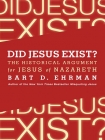Did Jesus Exist? - The Historical Argument for Jesus of Nazareth Bart Ehrman (books to read in your 20s txt) 📖

- Author: Bart Ehrman
Book online «Did Jesus Exist? - The Historical Argument for Jesus of Nazareth Bart Ehrman (books to read in your 20s txt) 📖». Author Bart Ehrman
As a zealous Jew persecuting Christians, Paul himself says that he was intent on “destroying” the “church of God” (Galatians 1:13). Obviously the followers of Jesus were saying things, or at least something, that Paul considered both colossally wrong and dangerous. Unfortunately, Paul never tells us what that something was, but it is not hard to figure out once one knows Paul’s later teachings and the standard Jewish expectations of the messiah.
Before detailing these, let me stress that Paul necessarily had close, personal contact with the people he was persecuting, on one level or another, and what little he knew about Jesus at the outset of his outrage (in say 31–32 CE or so) would have been augmented by these contacts. These people themselves would have come to know what they knew about Jesus before Paul persecuted them. And so we can say with virtual certainty that there were Christians with information about Jesus from within a year or two, at the very latest, of the traditional date of his death and that Paul knew at least something about what these people were saying about Jesus.
As we will see in greater detail in a later chapter, these Christians were not calling Jesus a dying-rising God. They were calling him the Jewish messiah. And they understood this messiah to be completely human, a person chosen by God to mediate his will on earth. That is the Jesus Paul first heard of. But there was nothing blasphemous about calling a Jewish teacher the messiah. That happened on and off throughout the history of Judaism, and it still happens in our day. In itself the claim that someone is the messiah is not blasphemous or, necessarily, problematic (though it may strike outsiders—and usually does—as a bit crazed). What Paul appears to have found offensive was that Jesus in particular was being called the messiah. The reason that was offensive is that Paul and everyone else knew that Jesus had been condemned to death by crucifixion. Jesus could scarcely then have been the messiah of God, for reasons that Paul would have found altogether compelling before changing his mind and becoming a follower of Jesus.
First it is necessary to see that Paul himself hints at the problem in his letter to the Galatians, which he wrote much later in his life, long after his conversion and early missionary work. In a particularly poignant passage in Galatians, Paul quotes a passage of scripture that must have been important to him even in his pre-Christian days, Deuteronomy 21:23: “Everyone who hangs on a tree is cursed.” In its original context in Deuteronomy, this is referring to the practice of hanging a human corpse on a tree as a public statement of shame and humiliation. Centuries later, when Romans were executing the most heinous criminals and lowlifes by crucifying them, this verse was taken to be equally applicable. Obviously anyone who was killed in this way stood under God’s curse.
Jesus too was crucified, as everyone knew—or at least said. And that was probably what led Paul, in the early 30s, to decide to persecute the Christians. They were saying that Jesus was God’s special chosen one, his beloved son, the messiah. But for the pre-Christian Paul it was quite clear: Jesus was not anything like God’s chosen one, the one selected to do his will on earth. Jesus did not enjoy God’s blessing. Just the opposite: he was under God’s curse. Evidence? He was hung on a tree.
But why would that be a problem? Wasn’t the messiah supposed to suffer horribly for the sins of others and be raised from the dead? Not according to ancient Jews. On the contrary, the messiah was not supposed to be killed at all. It is at this point that we need to consider what ancient Jews, including the pre-Christian Paul, thought about the messiah.
Ancient Views of the Messiah
The first thing to state, and to state emphatically, is that no Jew ever thought the messiah would be God. The only reason this point has to be raised is that today many Christians appear to think that this is what the messiah was supposed to be, God the savior come to earth. But this is not and never was a Jewish view. It is a Christian view only because Christians have always called Jesus the messiah and most Christians, still today, consider Jesus God. If Jesus is the messiah, the unspoken assumption goes, and if Jesus is God, then the messiah must be God. But this is Christian theology with no support in ancient Jewish thinking. The messiah was not God. He was one appointed by God or sent by God. There is only one God, and the messiah is the one God has “anointed” to be his special representative and to do his special work.
The word messiah is Hebrew and means “anointed one.” As I pointed out earlier, the Greek translation of the term is christos so that Jesus Christ literally means “Jesus the Messiah.” The origin of the term goes back into the ancient history of Israel, to the time when the nation was ruled by kings, who were said to have been specially favored, “anointed,” by God. In fact, the king was literally anointed during his inauguration ceremonies, when oil was poured on his head as a way of showing that he was specially favored by God, as seen in such passages as 1 Samuel 10:1 and 2 Samuel 23:1. Other persons thought to be God’s special representatives on earth, such as high priests, were sometimes anointed as well (see Leviticus 4:3, 5, 16). Even outside the Hebrew Bible, in the Jewish tradition we have records of such anointing ceremonies showing that a person stood under God’s special favor (for example, 2 Maccabees 1:10; the Testament of Reuben 6:8). In fact, any leader who was specially used by God could be called his anointed one; even the Persian king Cyrus, who was one





Comments (0)